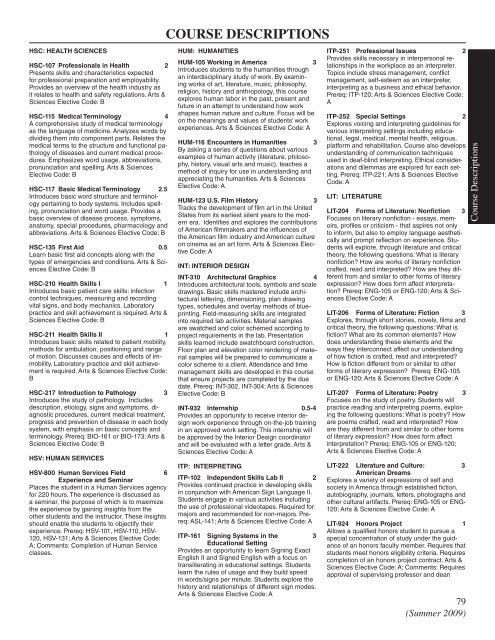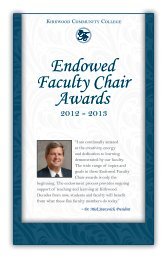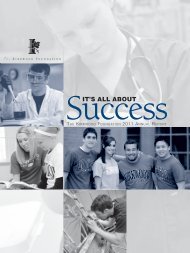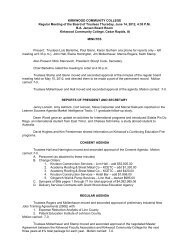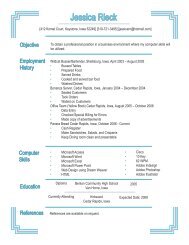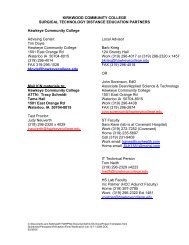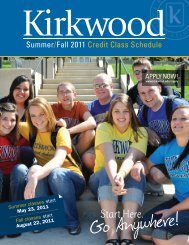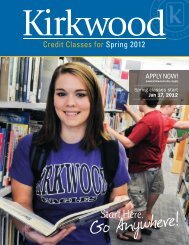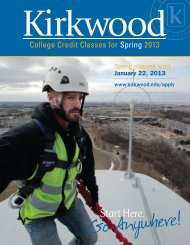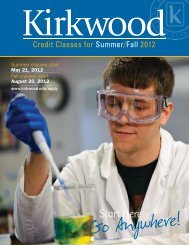Summer 2009 Credit Class Schedule - Kirkwood Community College
Summer 2009 Credit Class Schedule - Kirkwood Community College
Summer 2009 Credit Class Schedule - Kirkwood Community College
Create successful ePaper yourself
Turn your PDF publications into a flip-book with our unique Google optimized e-Paper software.
HSC: HEALTH SCIENCES<br />
HSC-107 Professionals in Health 2<br />
Presents skills and characteristics expected<br />
for professional preparation and employability.<br />
Provides an overview of the health industry as<br />
it relates to health and safety regulations. Arts &<br />
Sciences Elective Code: B<br />
HSC-115 Medical Terminology 4<br />
A comprehensive study of medical terminology<br />
as the language of medicine. Analyzes words by<br />
dividing them into component parts. Relates the<br />
medical terms to the structure and functional pathology<br />
of diseases and current medical procedures.<br />
Emphasizes word usage, abbreviations,<br />
pronunciation and spelling. Arts & Sciences<br />
Elective Code: B<br />
HSC-117 Basic Medical Terminology 2.5<br />
Introduces basic word structure and terminology<br />
pertaining to body systems. Includes spelling,<br />
pronunciation and word usage. Provides a<br />
basic overview of disease process, symptoms,<br />
anatomy, special procedures, pharmacology and<br />
abbreviations. Arts & Sciences Elective Code: B<br />
HSC-135 First Aid 0.5<br />
Learn basic fi rst aid concepts along with the<br />
types of emergencies and conditions. Arts & Sciences<br />
Elective Code: B<br />
HSC-210 Health Skills I 1<br />
Introduces basic patient care skills: infection<br />
control techniques, measuring and recording<br />
vital signs, and body mechanics. Laboratory<br />
practice and skill achievement is required. Arts &<br />
Sciences Elective Code: B<br />
HSC-211 Health Skills II 1<br />
Introduces basic skills related to patient mobility,<br />
methods for ambulation, positioning and range<br />
of motion. Discusses causes and effects of immobility.<br />
Laboratory practice and skill achievement<br />
is required. Arts & Sciences Elective Code:<br />
B<br />
HSC-217 Introduction to Pathology 3<br />
Introduces the study of pathology. Includes<br />
description, etiology, signs and symptoms, diagnostic<br />
procedures, current medical treatment,<br />
progress and prevention of disease in each body<br />
system, with emphasis on basic concepts and<br />
terminology. Prereq: BIO-161 or BIO-173; Arts &<br />
Sciences Elective Code: B<br />
HSV: HUMAN SERVICES<br />
HSV-800 Human Services Field 6<br />
Experience and Seminar<br />
Places the student in a Human Services agency<br />
for 220 hours. The experience is discussed as<br />
a seminar, the purpose of which is to maximize<br />
the experience by gaining insights from the<br />
other students and the instructor. These insights<br />
should enable the students to objectify their<br />
experience. Prereq: HSV-101, HSV-110, HSV-<br />
120, HSV-131; Arts & Sciences Elective Code:<br />
A; Comments: Completion of Human Service<br />
classes.<br />
COURSE DESCRIPTIONS<br />
HUM: HUMANITIES<br />
HUM-105 Working in America 3<br />
Introduces students to the humanities through<br />
an interdisciplinary study of work. By examining<br />
works of art, literature, music, philosophy,<br />
religion, history and anthropology, this course<br />
explores human labor in the past, present and<br />
future in an attempt to understand how work<br />
shapes human nature and culture. Focus will be<br />
on the meanings and values of students’ work<br />
experiences. Arts & Sciences Elective Code: A<br />
HUM-116 Encounters in Humanities 3<br />
By asking a series of questions about various<br />
examples of human activity (literature, philosophy,<br />
history, visual arts and music), teaches a<br />
method of inquiry for use in understanding and<br />
appreciating the humanities. Arts & Sciences<br />
Elective Code: A<br />
HUM-123 U.S. Film History 3<br />
Tracks the development of fi lm art in the United<br />
States from its earliest silent years to the modern<br />
era. Identifi es and explores the contributions<br />
of American fi lmmakers and the infl uences of<br />
the American fi lm industry and American culture<br />
on cinema as an art form. Arts & Sciences Elective<br />
Code: A<br />
INT: INTERIOR DESIGN<br />
INT-310 Architectural Graphics 4<br />
Introduces architectural tools, symbols and scale<br />
drawings. Basic skills mastered include architectural<br />
lettering, dimensioning, plan drawing<br />
types, schedules and overlay methods of blueprinting.<br />
Field-measuring skills are integrated<br />
into required lab activities. Material samples<br />
are swatched and color schemed according to<br />
project requirements in the lab. Presentation<br />
skills learned include swatchboard construction.<br />
Floor plan and elevation color rendering of material<br />
samples will be prepared to communicate a<br />
color scheme to a client. Attendance and time<br />
management skills are developed in this course<br />
that ensure projects are completed by the due<br />
date. Prereq: INT-302, INT-304; Arts & Sciences<br />
Elective Code: B<br />
INT-932 Internship 0.5-4<br />
Provides an opportunity to receive interior design<br />
work experience through on-the-job training<br />
in an approved work setting. This internship will<br />
be approved by the Interior Design coordinator<br />
and will be evaluated with a letter grade. Arts &<br />
Sciences Elective Code: A<br />
ITP: INTERPRETING<br />
ITP-102 Independent Skills Lab II 2<br />
Provides continued practice in developing skills<br />
in conjunction with American Sign Language II.<br />
Students engage in various activities including<br />
the use of professional videotapes. Required for<br />
majors and recommended for non-majors. Prereq:<br />
ASL-141; Arts & Sciences Elective Code: A<br />
ITP-161 Signing Systems in the 3<br />
Educational Setting<br />
Provides an opportunity to learn Signing Exact<br />
English II and Signed English with a focus on<br />
transliterating in educational settings. Students<br />
learn the rules of usage and they build speed<br />
in words/signs per minute. Students explore the<br />
history and relationships of different sign modes.<br />
Arts & Sciences Elective Code: A<br />
ITP-251 Professional Issues 2<br />
Provides skills necessary in interpersonal relationships<br />
in the workplace as an interpreter.<br />
Topics include stress management, confl ict<br />
management, self-esteem as an interpreter,<br />
interpreting as a business and ethical behavior.<br />
Prereq: ITP-120; Arts & Sciences Elective Code:<br />
A<br />
ITP-252 Special Settings 2<br />
Explores voicing and interpreting guidelines for<br />
various interpreting settings including educational,<br />
legal, medical, mental health, religious,<br />
platform and rehabilitation. Course also develops<br />
understanding of communication techniques<br />
used in deaf-blind interpreting. Ethical considerations<br />
and dilemmas are explored for each setting.<br />
Prereq: ITP-221; Arts & Sciences Elective<br />
Code: A<br />
LIT: LITERATURE<br />
LIT-204 Forms of Literature: Nonfi ction 3<br />
Focuses on literary nonfi ction - essays, memoirs,<br />
profi les or criticism - that aspires not only<br />
to inform, but also to employ language aesthetically<br />
and prompt refl ection on experience. Students<br />
will explore, through literature and critical<br />
theory, the following questions: What is literary<br />
nonfi ction? How are works of literary nonfi ction<br />
crafted, read and interpreted? How are they different<br />
from and similar to other forms of literary<br />
expression? How does form affect interpretation?<br />
Prereq: ENG-105 or ENG-120; Arts & Sciences<br />
Elective Code: A<br />
LIT-206 Forms of Literature: Fiction 3<br />
Explores, through short stories, novels, fi lms and<br />
critical theory, the following questions: What is<br />
fi ction? What are its common elements? How<br />
does understanding these elements and the<br />
ways they interconnect affect our understanding<br />
of how fi ction is crafted, read and interpreted?<br />
How is fi ction different from or similar to other<br />
forms of literary expression? Prereq: ENG-105<br />
or ENG-120; Arts & Sciences Elective Code: A<br />
LIT-207 Forms of Literature: Poetry 3<br />
Focuses on the study of poetry. Students will<br />
practice reading and interpreting poems, exploring<br />
the following questions: What is poetry? How<br />
are poems crafted, read and interpreted? How<br />
are they different from and similar to other forms<br />
of literary expression? How does form affect<br />
interpretation? Prereq: ENG-105 or ENG-120;<br />
Arts & Sciences Elective Code: A<br />
LIT-222 Literature and Culture: 3<br />
American Dreams<br />
Explores a variety of expressions of self and<br />
society in America through established fi ction,<br />
autobiography, journals, letters, photographs and<br />
other cultural artifacts. Prereq: ENG-105 or ENG-<br />
120; Arts & Sciences Elective Code: A<br />
LIT-924 Honors Project 1<br />
Allows a qualifi ed honors student to pursue a<br />
special concentration of study under the guidance<br />
of an honors faculty member. Requires that<br />
students meet honors eligibility criteria. Requires<br />
completion of an honors project contract. Arts &<br />
Sciences Elective Code: A; Comments: Requires<br />
approval of supervising professor and dean<br />
79<br />
(<strong>Summer</strong> <strong>2009</strong>)<br />
Course Descriptions


